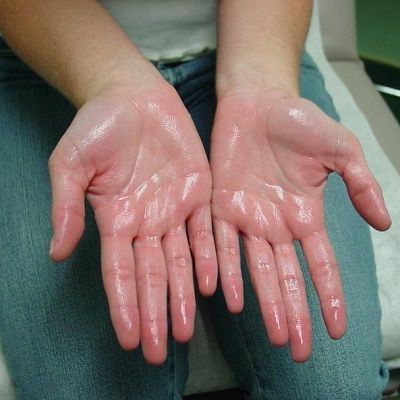Understanding the Origin of Excessive Sweating and Its Effect on Day-to-day Live
Excessive sweating, likewise referred to as hyperhidrosis, is a condition that impacts a substantial section of the population, yet its underlying causes and ramifications on day-to-day functioning stay rather enigmatic. While it is commonly comprehended as a physical feedback to regulate body temperature, the triggers for extreme sweating can differ extensively amongst people, encompassing not only physical elements yet psychological and likewise emotional components. The influence of this problem expands past simple pain, usually affecting social communications and overall quality of life. By delving right into the source of hyperhidrosis and discovering its diverse impacts, a deeper understanding of this prevalent issue can be obtained, clarifying the intricacies that people facing extreme sweating navigate daily.
Physiology of Sweat Glands
The regulation of sweat production, an essential physiological procedure, is mainly regulated by the task of sweat glands dispersed throughout the human body. Gland are categorized right into two main kinds: eccrine and apocrine glands. Eccrine glands are the most countless and are discovered in nearly all areas of the body. They play an essential function in thermoregulation by producing a watery fluid onto the skin's surface area, which evaporates and aids cool down the body down. In contrast, apocrine glands are focused in areas abundant in hair follicles, such as the underarms and groin, and their secretions are thicker and milklike in appearance.
When the body temperature level rises, either because of physical task, heats, or psychological stress, the nerves causes the gland to produce sweat. This sweat is made up largely of water and electrolytes like sodium and chloride. The process of sweat manufacturing is essential for preserving the body's inner temperature level within a slim, optimal variety, highlighting the vital duty sweat glands play in human physiology.
Triggers for Excessive Sweating
In comprehending the origin of excessive sweating, it is essential to recognize the triggers that can result in this physical feedback. Too much sweating, also called hyperhidrosis, can be triggered by different aspects, both ecological and physiological. One common trigger is emotional tension or stress and anxiety, which can promote the body's sweat glands to create even more sweat than is necessary for cooling. Physical exertion, high temperatures, and spicy foods are also known to set off excessive sweating in individuals prone to this problem. Additionally, specific medical conditions like menopause, hyperthyroidism, or diabetes can add to extreme sweating also.
Moreover, medicines such as some antidepressants, opioids, and specific supplements can also act as triggers for hyperhidrosis. Recognizing these triggers is necessary in handling extreme sweating efficiently - Treatment for hyperhydrosis of hands. By identifying and addressing the certain triggers that motivate too much sweating in a private, medical care carriers can develop tailored treatment strategies to reduce this problem and improve the individual's lifestyle
Medical Conditions Associated
Connected with extreme sweating are various clinical conditions that can worsen this physical reaction. One usual condition is hyperhidrosis, a condition identified by extraordinarily increased sweating that surpasses the body's thermoregulatory demands. This can manifest in focal areas like the hands, soles, underarms, or face, influencing an individual's high quality of life because of social shame and discomfort.
Additionally, endocrine conditions such as hyperthyroidism, diabetic issues, and menopausal warm flashes can additionally bring about too much sweating. Hyperthyroidism causes an overproduction of thyroid hormones, accelerating metabolism and triggering sweating. Diabetes can induce sweating episodes, particularly during hypoglycemic episodes when blood sugar degrees go down also reduced. Menopausal warm flashes, credited to hormonal changes during menopause, can cause sudden and extreme sweating, typically gone along with by flushing and heart palpitations.
Furthermore, infections like hiv, consumption, and endocarditis have actually been related to evening sweats, a common signs and symptom recognized to interrupt rest and impact overall health. These clinical conditions highlight the varied variety of underlying elements that can add to too much sweating, necessitating comprehensive evaluation and monitoring by healthcare specialists.
Emotional and Mental Factors

Influence On Social Communications
Extreme sweating can have profound impacts on an individual's capability to involve conveniently in social communications. The visible indicators of sweat stains or wet spots on clothes check this site out can bring about humiliation and self-consciousness, creating people to take out from social situations. This withdrawal can impact partnerships, restriction social tasks, and hinder expert and individual development.

Additionally, the anxiousness and self-esteem issues coming from extreme sweating can influence interaction and interpersonal skills. Individuals may have a hard time to concentrate on discussions, get involved in team tasks, or express themselves confidently. This can result in feelings of isolation and solitude, as social connections end up being testing to preserve.
Final Thought
:max_bytes(150000):strip_icc()/sweaty-palms-palmar-hyperhidrosis-4691320-10512b2d428846059753b76df6dc74c2.png)
While it is frequently comprehended as a physiological reaction to regulate body temperature, the triggers for too much sweating can differ commonly among individuals, incorporating not just physical aspects however emotional and likewise emotional elements. By diving into the root creates of hyperhidrosis and discovering its diverse effects, a much deeper understanding of this pervasive issue can be obtained, dropping light on the complexities that people grappling with too much sweating navigate on a daily basis.
Physical physical effort, high temperatures, and spicy foods are also recognized to set off excessive sweating in people susceptible to this problem. By recognizing and dealing with the specific triggers More Help that motivate extreme sweating in an individual, health care suppliers can develop tailored treatment strategies to ease this condition and boost the individual's top quality of life.
Extreme sweating can have extensive impacts on a person's ability to involve conveniently in social communications.